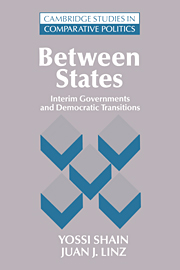Book contents
- Frontmatter
- Contents
- Preface
- Contributors
- PART ONE THEORY
- Introduction
- 1 Provisional governments: Revolutionaries and moderates
- 2 The power-sharing model
- 3 The caretaker government model
- 4 The international interim government model revisited
- 5 The timing and nature of first democratic elections
- 6 Conclusions
- PART TWO CASE STUDIES
- Index
Introduction
Published online by Cambridge University Press: 05 August 2012
- Frontmatter
- Contents
- Preface
- Contributors
- PART ONE THEORY
- Introduction
- 1 Provisional governments: Revolutionaries and moderates
- 2 The power-sharing model
- 3 The caretaker government model
- 4 The international interim government model revisited
- 5 The timing and nature of first democratic elections
- 6 Conclusions
- PART TWO CASE STUDIES
- Index
Summary
He who desires or attempts to reform the government of a state, and wishes to have it accepted and capable of maintaining itself to the satisfaction of everybody, must at least retain the semblance of the old forms; so that it may seem to the people that there has been no change in the institutions, even though they are entirely different from the old ones.
Niccolò MachiavelliThe newly emerging regimes, democracies or otherwise, around the world, including those of the breakaway republics of the former Soviet Union, provide a wide range of vastly different possibilities for political change and regime transitions. This range includes states that have been challenged on either one or two fronts: the legitimacy of the political entity itself and/or the nature of its regime.
First, there are states whose very existence, because of their multiethnic compositions and the crisis associated with political changes in nondemocratic regimes, failed to acquire or sustain de jure status over the full territory to which they claim sovereignty. This fact has led to the complete dissolution of the states, the partial breakup of constituent entities within the former state, the emergence of new states, or the subsuming of, or capitulation to, former state institutions. Examples of the last two categories could be the way in which Yeltsin and Russia absorbed the major institutions of Soviet power, and the way the former German Democratic Republic was absorbed by the larger institutions of the Federal Republic.
- Type
- Chapter
- Information
- Between StatesInterim Governments in Democratic Transitions, pp. 3 - 27Publisher: Cambridge University PressPrint publication year: 1995
- 1
- Cited by

